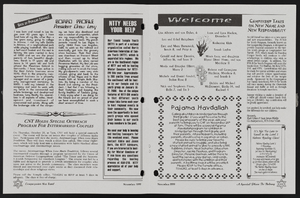Search the Special Collections and Archives Portal
Search Results

Myron E. Leavitt interview, March 14, 1978: transcript
Date
Archival Collection
Description
On March 14, 1978, collector Thomas Neill interviewed Myron E. Leavitt (born October 27th, 1930 in Las Vegas, Nevada) at his law office in Las Vegas, Nevada. In this interview, Leavitt discusses his law practice and running for various positions in Las Vegas, Nevada. He also speaks about growing up, playing sports, and coaching multiple sports in Las Vegas.
Text

Relda W. Leavitt interview, March 18, 1976: transcript
Date
Archival Collection
Description
On March 18, 1976, collector David Steele Broussard interviewed Relda Whitney Leavitt (born April 3rd, 1917 in Saint Thomas, Nevada) at her home in Las Vegas, Nevada. In this interview, Mrs. Leavitt discusses growing up in Saint Thomas, Nevada before her family moved to Las Vegas. She also discusses moving to Las Vegas, Nevada and her family’s dairy business in Whitney, Nevada. She speaks about the different changes and growth she has seen in Las Vegas over the years.
Text

Rena Lees interview, March 19, 1978: transcript
Date
Archival Collection
Description
On March 19, 1978, collector Bill Young interviewed Rena Lees (born October 15th, 1934 in Las Vegas, Nevada) at her home in Las Vegas, Nevada. In this interview, Rena Lees talks about growing up in Las Vegas and the activities she was involved in as a teenager. She also discusses her family and her career working at Sunrise Hospital.
Text

Jean Sherman McColl interview, March 1, 1977: transcript
Date
Description
On March 1, 1977, collector Sam C. Melchiome Jr. interviewed Jean McColl (born May 24th, 1931 in California) at her home in Las Vegas, Nevada. In this interview, Jean McColl discusses growing up in Searchlight and then Las Vegas, Nevada. She discusses how her family came here as well as the many changes she has seen through the decades living in Las Vegas, Nevada.
Text

Interview with Cecil C. Garland, July 19, 2006
Date
Archival Collection
Description
Text

Interview with James Ogle, April 6, 2005
Date
Archival Collection
Description
Text
Transcript of bus tour of "Jewish Las Vegas" by Temple Beth Sholom, May 17, 2015
Date
Archival Collection
Description
Temple Beth Sholom organized and led a bus tour of parts of Las Vegas that are significant in local Jewish history. Stops on the tour included Woodlawn Cemetery and the former Temple Beth Sholom campus on Oakey Boulevard. Narrator Arlene Blut gives the overview of the Jewish community, and Rabbi Felipe Goodman talks to tour participants at the cemetery. Former Las Vegas mayor Oscar Goodman speaks at the old synagogue along with Josh Abbey, whose mother created the stained glass windows at the temple.
Text

Interview with Ann G. Dye, November 1, 2004
Date
Archival Collection
Description
Text

Interview with George Robert Maynard, Sr., January 26, 2004
Date
Archival Collection
Description
Text

